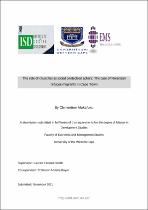| dc.contributor.advisor | Tavener-Smith, Lauren | |
| dc.contributor.author | Mukafuku, Clementine | |
| dc.date.accessioned | 2022-03-30T10:55:57Z | |
| dc.date.available | 2022-03-30T10:55:57Z | |
| dc.date.issued | 2021 | |
| dc.identifier.uri | http://hdl.handle.net/11394/9005 | |
| dc.description | Magister Artium (Development Studies) - MA(DVS) | en_US |
| dc.description.abstract | Migrants and refugees are mostly excluded from the public sector, marginalised from economic activities and threatened by recurrent risks, including unemployment and lack of income. These problems cause vulnerability to economic shocks and deepening poverty. Churches and religious organisations assist migrants through activities that enhance social protection by means of informal coping mechanisms. The study examined factors that contribute towards informal social protection through church activities that facilitate Rwandan refugees and asylum seekers’ lives in Cape Town, South Africa. The literature reviewed in this study reveals that church initiatives and activities contributed significantly towards the reduction of challenges faced by refugees and asylum-seekers. | en_US |
| dc.language.iso | en | en_US |
| dc.publisher | University of Western Cape | en_US |
| dc.subject | Social protection | en_US |
| dc.subject | Formal social protection | en_US |
| dc.subject | Informal social protection | en_US |
| dc.subject | Migrants | en_US |
| dc.subject | Church | en_US |
| dc.subject | Rwanda | en_US |
| dc.title | The role of churches as social protection actors: The case of Rwandan refugee migrants in Cape Town | en_US |
| dc.rights.holder | University of Western Cape | en_US |

